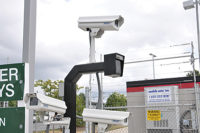
The financing squeeze that started one to two years ago has affected virtually every industry — and security is no exception. But security dealers have not been impacted as severely as some other types of businesses, and some financial experts focusing on security see signs that the tight credit market is beginning to loosen — at least a little.
NEW REALITIES
The security business is capital-intensive. Dealers that want to achieve high growth often need outside financing to achieve that goal. Some dealers also may view this as a good time to acquire competitors that may be ready to exit the business and may need to borrow money to do that. But finding sources of funding is more difficult today than it was previously.
“When the recession hit, banks viewed security as specialty financing or linked to construction,” explains Jennifer Holloway, director of financial services for Irving, Texas-based lender CMS Capital Advantage. “They viewed it as increased risk. Suddenly alarm companies got a call from their bank saying their credit limit was reduced by the amount outstanding on their loan.”
Fortunately for dealers in that situation, lenders such as CMS Capital Advantage that specialize in security are still making loans. “We fill the void,” Holloway says. “For a new lender to come in and provide a line of credit, they have to pay off the old lender. We have done that for some dealers.”
Some potential sources of funding have essentially vanished, however. Between 1993 and 2008, about 80 percent of all U.S. loans were made by what Bill Polk, managing director for Chevy Chase, Md.-based Capital Source, calls “shadow bankers,” which he defines as organizations that relied on raising capital in capital markets, rather than on deposits. Those were the kinds of organizations that operated hedge funds and invested in sub-prime mortgages and as Polk explains, “That’s all gone now — only 20 percent of the sources of capital that were available previously are still operating in a fully functional way.”
“Generally speaking, we have learned that risk was ‘titanically’ underpriced,” Polk says. “We had too much liquidity chasing too much low-quality business at prices that didn’t reflect the risk being assumed. Lenders now are doing a more rigorous job of understanding risk.”
The upshot is that interest rates have increased to reflect what lenders perceive as increased risk — and lenders may not be willing to loan as much to an individual company as they would have in the past.
One lender to the security industry says loan requirements haven’t changed, but borrowers may not qualify for the recurring monthly revenue (RMR) advance rates that they would have in the past simply because the economic downturn has impacted the company’s performance. “Company financial performance determines both valuations and the amount of debt that lenders are willing to provide,” explains David Stang, Chicago-based senior vice president for Bank of America.
“The amount lenders were willing to lend on RMR was a multiple of 26 to 28,” notes Jeff Kessler, the New York-based managing director for Imperial Capital. “Now it’s 20 to 22.”
Some lenders also are attaching stricter terms to their loan agreements. For example, Kessler explains that even though interest rates have decreased overall, some lenders have put what he calls “LIBOR floors” on loan agreements. The LIBOR, or London Interbank Offered Rate, is the interest rate at which banks are willing to lend money to each other; it fluctuates based on market conditions. A LIBOR floor essentially sets a minimum rate to which the interest rate on a specific loan can fall.
Since the downturn, loans also are likely to have stricter covenants attached to them. One example might be to require the borrower to maintain a certain ratio of RMR or earnings before interest, taxes, depreciation and amortization (EBITDA) to debt. “The covenant-light loan is a thing of the past,” Kessler says. He adds, however, that “covenants that were incredibly heavy have begun to lighten a bit and we’re seeing the beginning of the elimination of LIBOR floors.”
Because of the costs involved for the lender in making an individual loan, smaller alarm dealers have always had more difficulty getting loans and getting good terms than larger players — and that trend may have become more pronounced since the downturn. “It’s easier to find $10 million than $250,000,” Polk comments. “Many commercial lenders specializing in small businesses have pulled in their horns.”
As a result, smaller dealers may be more likely today to turn toward dealer programs as a source of financing (see related story on page 80). Companies offering dealer programs pick up the RMR or part of the RMR from a dealer’s accounts, paying the dealer a one-time upfront fee based on an RMR multiple.
While dealer programs typically are set up on an ongoing basis, with the dealer getting money for new accounts as they are added, some organizations, including San Ramon, Calif.-based SAFE Security, will buy a block of accounts from a dealer on a one-time basis.
“We’re seeing more people wanting to sell,” comments Paul Sargenti, president and CEO of SAFE Security. He adds, however, that accounts may not be worth as much as they would have been before the economic downturn — and not every dealer has accepted that reality.
Alarm Funding Associates of West Chester, Pa., another company that buys blocks of accounts from dealers, has a bit different take. “Valuations have maintained pretty well in this economy,” comments Joe Monachino, Alarm Funding’s chief marketing officer. “We value accounts based on the length of service of the customer base. We deal with traditional alarm companies that have been in business for 10 to 20 years.” Dealers selling accounts to Alarm Funding Associates continue to service those accounts and, Monachino says, the accounts have a high likelihood of retaining service, which means they may be just as valuable as they were prior to the downturn.
BY COMPARISON
Despite increased challenges, however, the security industry has been less heavily impacted by the financing squeeze than some other industries. While financing for some industries has dried up completely, there is a core group of lenders familiar with the security industry that have remained optimistic about the industry’s future and continued to make loans to security dealers.
“Over the last several decades, no lender has suffered major losses in security, so there’s no real reason for lenders to pull back,” Sargenti relates.
Polk adds that, although interest rates are higher than they were prior to the pullback in the financial markets, those rates are still lower than they have been in the past.
But, “as a result, many smaller alarm dealers, who often have well-run traditional businesses, are forced to sell out completely,” says Amy Kothari, president of Media, Pa.-based Alarm Capital Alliance, which purchases alarm companies’ accounts “at competitive multiples with no minimum account requirements,” according to the company’s Web site. Kothari relates that, “Alarm Capital’s business model allows the smaller alarm dealer to secure much-needed capital, stay in business and continue to grow.”
One thing that hasn’t changed is lenders’ advice for borrowers. “Lenders want to know the funds are going to better the company in some way,” Holloway says. “Dealers need to understand their creation costs and how they got where they are and where they need to go in the future. They need to look at the business from an outsider’s perspective.”
The Franchise Route
Although some security dealers have struggled since the economic downturn began one to two years ago, that hasn’t been true for everyone. Security 101, a company with several locations headquartered in Pompano Beach, Fla., has had a 128 percent increase over the last 12 months — an accomplishment that owner Rich Montalvo attributes, in part, to the fact that he is a franchisee of a larger national organization with the same name.
“There were a lot of accounts that I garnered this year that I had very little to do with,” Montalvo comments. With 19 franchisees nationwide focusing strictly on the commercial market, Security 101 functions for end user organizations as if it were a single nationwide company. A franchisee in one part of the country may sell a job to a customer with multiple locations who also needs work in other parts of the country, and other Security 101 franchisees can pick up that work. Because all franchisees operate based on the same standards and with the same processes, the customer obtains a high level of consistency from one area to another.
When Montalvo started his company in 2005, he opted to purchase a franchise rather than going it alone because he believed he would grow more quickly. As he puts it, “If you follow the model and use the tools, you will be successful.”
Since the downturn, Security 101 has received a higher level of inquiries from people considering becoming a franchisee, notes Steve Crespo, president of the Marietta, Ga.-based franchisor business. “They’re not people who were let go from their jobs, but they may see that there are no guarantees of a long-term career,” Crespo says.
Buying into a franchise requires a substantial upfront investment, and the franchisor receives a percentage of revenues as a royalty. Depending on the franchisor, franchisees may get management software, training, sales tools and other benefits. Franchisors typically check out franchisees’ credit ratings and business references before accepting them into the program. They also look for some less tangible qualities.
“We’re looking for personality more than anything,” comments Mary Jezioro, vice president for Shield Security, a Buffalo, N.Y.-based company that has been offering franchises for nearly two decades. Jezioro seems to be speaking on behalf of all franchisors when she says, “We want someone with vision, enthusiasm and a positive attitude.”
Initially many Shield Security franchisees came from outside the security business, but more recently, the organization has added security dealers that already had some accounts and wanted to grow more rapidly. Because they weren’t starting from scratch, those companies paid lower upfront fees, Jezioro says. Since the downturn, Shield has seen “more interest and better candidates,” she comments. The company also has been taking greater pains to make sure all the numbers provided by candidates are correct.
The variety of franchise options continues to grow. Brookfield, Wis.-based America In-Home happened to launch just about the time the downturn began two years ago, but that hasn’t prevented the company from signing up two franchisees. The company focuses on structured wiring, distributed audio/video, central vacuum and home theater as well as security, and initial startup costs range from $72,000 to $189,000, explains Howard Kaplan, head of franchise development. Businesses that already have a showroom, computer equipment and other assets would fall near the lower end of the scale. In addition, Kaplan says, dealers should plan to provide up to an additional $27,000 in working capital. “They need about a third of that in cash,” Kaplan says. “If they have good credit, they can finance the balance.”
Another new franchise option is Ft. Wayne, Ind.-based The Spy Place. Scheduled to be available beginning in early 2010, each franchise will be centered on what founder Ray Huck calls “a high energy retail store” that will offer the latest gadgets, such as watch recorders, nanny cams and do-it-yourself video surveillance cameras. In addition each store will have a showroom that will be used to generate sales of professionally installed video surveillance. Franchisees also will handle access control, lighting control and global positioning systems and will have the option of branching out into other related areas, such as document destruction, vehicle recovery and security services. The Spy Place is a very strong brand, Huck says — and the 700 or so leads the company has received to date would certainly seem to support that assertion.




